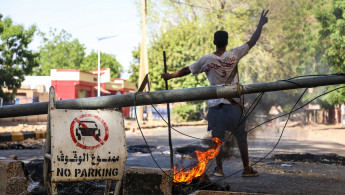Sudan army, protesters agree on transition period amid clashes
The clashes flared up on Wednesday in Khartoum between protesters and forces from the paramilitary Rapid Support Forces who attempted to remove barricades in a main street.
The violence came hours before the ruling military council and opposition leaders announced that they had made progress in talks regarding the transition to civilian rule.
The Sudanese Professionals Association said the force used batons and whips to disperse protesters.
The Sudan Doctors Committee, which is part of the SPA, said on Wednesday night that at least 14 people, all of them young people, were wounded in the clashes, including seven from gunshots.
- talks suspended -
However, SPA spokesman Ahmed Rabie said that the talks were suspended late Wednesday by the military council.
He said the council has called for the removal of barricades and opening of the roads in Khartoum and elsewhere in the country.
Sudan's ruling generals and opposition leaders behind the protests that drove former President Omar al-Bashir from power last month said Wednesday they have made significant progress in negotiations and have agreed on the length of the country's transition period.
The two sides, which have been at odds over the transfer of power to civilian rule and the extent of the military's role in it, said the transition would last three years.
The military ousted Bashir on April 11, after nearly four months of mass protests against his 30-year rule.
The agreement announced Wednesday marks a significant step toward resolving the standoff between the military and the protesters and could help the Sudanese return to some sort of normalcy.
In a joint press conference Wednesday, Lt Gen Yasser al-Atta, a member of the military council, said the two sides agreed to a three-year transition period.
The priority for the first six months will be to get the various armed rebel groups across the country to agree to peace talks, he said.
The protesters are represented by the Forces for the Declaration of Freedom and Change, a coalition of opposition groups led by the SPA, a union umbrella that has spearheaded the protests against Bashir since December.
Atta said the two sides also agreed on the makeup of a 300-member, all-civilian transitional legislative body.
He said two-thirds of this interim parliament will be made up of representatives of the protesters while the remaining third will be made up of parties that were not part of Bashir's regime.
What remains to be discussed on the negotiating table is the makeup of the sovereign council, a deal Atta said he hoped would be reached by the next day.
"Within less than 24 hours, there will be a complete deal, and the Sudanese people will celebrate of achieving the goals of their peaceful revolution," he said.
Clashes in Khartoum on Monday and left six people dead and 200 wounded, disrupted the negotiations.
The violence erupted when some security forces, apparently loyal to Bashir, attacked the protesters' sit-ins overnight, including the one in Khartoum outside the military headquarters.
Madani Abbas, a negotiator for the protesters, said the military council would investigate the attacks.





 Follow the Middle East's top stories in English at The New Arab on Google News
Follow the Middle East's top stories in English at The New Arab on Google News
![The UAE is widely suspected of arming the RSF militia [Getty]](/sites/default/files/styles/image_330x185/public/2024-11/GettyImages-472529908.jpg?h=69f2b9d0&itok=Yauw3YTG)
![Netanyahu furiously denounced the ICC [Getty]](/sites/default/files/styles/image_330x185/public/2024-11/GettyImages-2169352575.jpg?h=199d8c1f&itok=-vRiruf5)
![Both Hamas and the Palestinian Authority welcomed the ICC arrest warrants [Getty]](/sites/default/files/styles/image_330x185/public/2024-11/GettyImages-2178351173.jpg?h=199d8c1f&itok=TV858iVg)